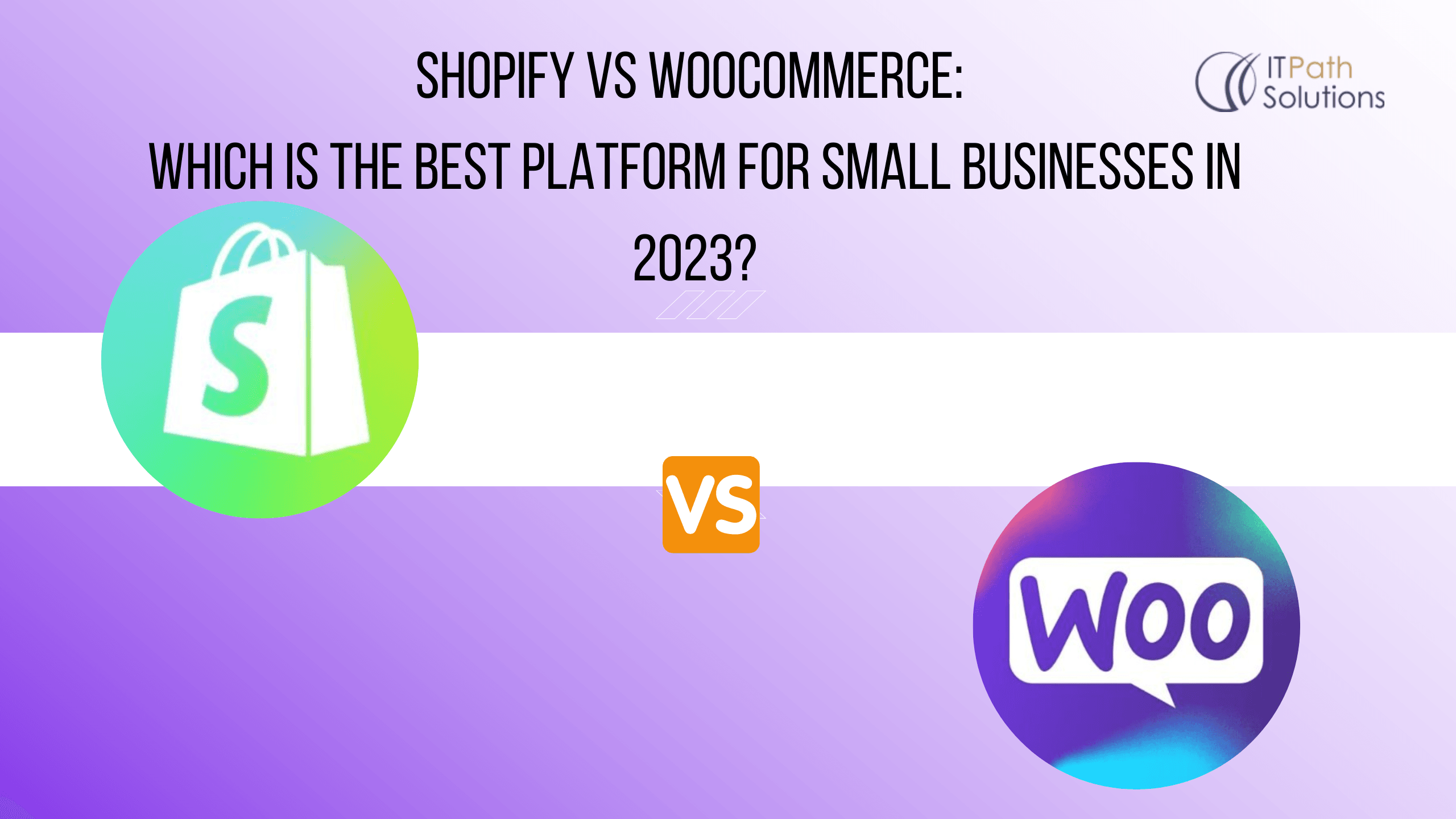Shopify vs WooCommerce: Which Is The Best Platform For Small Businesses in 2023?
shopify
Introduction
eCommerce platforms such as Shopify and WooCommerce are dominating the web. More than 1.7 Million merchants around the globe use Shopify to sell their products and services online. Add to that, nearly 5,106,506 websites are being powered by WooCommerce. There is tremendous scope in eCommerce for pwoering the next chapter of your business by selling your products and services online and tapping into a new customer base. Most business owners get confused between choosing Shopify or WooCommerce. We want to help them make a decision with this brief article.
The topics to be covered are:
- Overview of Shopify
- Overview of WooCommerce
- Comparison of Key Features
- Pricing
Overview Of Shopify

Shopify is a fully hosted e-commerce platform that allows small businesses to create and run an online store. It is a Software-as-a-Service (SaaS) solution, which means that the platform is hosted by Shopify, and all the necessary technical maintenance, updates and backups are handled by Shopify.
To set up a store on Shopify, businesses simply need to sign up for an account, choose a design template, and add their products. Shopify provides a user-friendly interface that makes it easy for small business owners to manage their online store without the need for technical expertise.
Some of the key features of Shopify include:
- A wide range of design templates to choose from
- Easy to use product management tools
- Built-in shopping cart and checkout
- Support for multiple languages and currencies
- A wide range of third-party apps and integrations available through the Shopify app store
- SEO features to optimize the store for search engines
- Secure payment gateway options
- Built-in analytics to track store performance
In summary, Shopify is a fully hosted, easy to set-up and use e-commerce platform that offers a wide range of features and integrations for small businesses to create and run an online store.
Overview of WooCommerce
WooCommerce is an open-source e-commerce plugin for WordPress, which allows small businesses to create and run an online store on their WordPress website. It is a self-hosted platform, which means that the small business is responsible for hosting their own website and managing the technical aspects such as updates, backups and maintenance.
To set up a store on WooCommerce, businesses will first need to have a WordPress website, then they can install the WooCommerce plugin and customize the store to their liking. It offers a wide range of customization options, but it may require more technical expertise to set up and manage as compared to a fully hosted platform like Shopify.
Some of the key features of WooCommerce include:
- High level of customization options available
- Access to a wide range of WordPress themes and plugins
- Built-in product management tools
- Built-in shopping cart and checkout
- Support for multiple languages and currencies
- Built-in SEO features
- Secure payment gateway options
- Built-in analytics to track store performance
In summary, WooCommerce is an open-source e-commerce plugin for WordPress which offers high level of customization options and access to a wide range of WordPress themes and plugins, but it may require more technical expertise to set up and manage as compared to a fully hosted platform like Shopify.
Shopify vs. WooCommerce

When comparing the key features of Shopify and WooCommerce, it is important to consider aspects such as ease of use, customization options, security, and integrations.
Ease of Use: Shopify is known for its ease of use, with a user-friendly interface that makes it easy for small business owners to manage their online store without the need for technical expertise. WooCommerce is also easy to use, but it may require more technical expertise to set up and manage as compared to Shopify, especially when it comes to customizing the design and functionality of the store.
Customization Options: WooCommerce offers a high level of customization options, as it is built on WordPress, which has a wide range of themes and plugins available. Shopify also offers a wide range of design templates and customization options, but it may not be as flexible as WooCommerce.
Security: Both Shopify and WooCommerce provide secure payment gateway options and PCI-compliant checkout pages. However, Shopify is known for its strong focus on security and compliance, which can be important for small businesses.
Integrations: Both Shopify and WooCommerce have a wide range of third-party apps and integrations available, but Shopify has a larger app store with more options.
Payment Processing: Shopify offers its own payment gateway, Shopify Payments, making it easy to accept credit card payments. It also supports various third-party payment gateways.
Scalability: WooCommerce is suitable for businesses of all sizes, from small startups to large enterprises. It can grow with your business.
Support: Shopify offers 24/7 customer support, which can be invaluable when you encounter issues or have questions.
SEO: WooCommerce is well-integrated with WordPress, making it a strong choice for SEO and content marketing efforts.
In summary, while both platforms are popular choices for small businesses, they have different strengths and weaknesses. Shopify is known for its ease of use and strong focus on security, while WooCommerce offers a high level of customization options. Ultimately, the best platform for a small business will depend on their specific needs and resources.
Pricing Comparison of Shopify & WooCommerce
When it comes to pricing, both Shopify and WooCommerce have different models and costs associated with them.
Shopify offers several pricing plans, ranging from $29 to $299 per month. The basic plan includes features such as unlimited products, manual order creation, and fraud analysis, while the higher-priced plans include more advanced features such as gift card and professional reports. In addition to the monthly subscription, there is also a transaction fee of 2.9% + 30¢ for using an external payment gateway, unless you use Shopify payments.
WooCommerce, on the other hand, is a free open-source plugin for WordPress, which means that the only cost associated with it is the cost of hosting and a domain. However, the cost of hosting and a domain can vary widely depending on the hosting provider and the type of hosting plan you choose.
In terms of additional costs, for Shopify the costs may include transaction fees, app and plugin costs, and cost of theme if you choose to purchase a custom one. For WooCommerce, the costs may include plugin costs, and cost of theme if you choose to purchase a custom one.
In summary, while Shopify has a monthly subscription cost and transaction fees, WooCommerce is free to use, but it may have additional costs such as hosting, domain, plugin, and theme costs. The best option will depend on your specific needs and budget.
In conclusion, Shopify and WooCommerce are both popular e-commerce platforms for small businesses, but they have different strengths and weaknesses. Shopify is a fully hosted platform that is easy to set up and use, with a wide range of features and integrations available. It also has a strong focus on security and compliance, which can be important for small businesses. However, it can be more expensive than other options and may not be as customizable as other platforms.
WooCommerce, on the other hand, is an open-source plugin for WordPress, which means it is highly customizable, but may require more technical expertise to set up and use. It offers a high level of customization options and access to a wide range of WordPress themes and plugins.
When it comes to pricing, Shopify offers several pricing plans, while WooCommerce is free to use, but it may have additional costs such as hosting, domain, plugin and theme costs.
Conclusion
Based on these points, we can see that the best platform for a small business will depend on their specific needs and resources. If a small business prioritizes ease of use and security, Shopify might be the best option for them, on the other hand, if a small business prioritizes customization options and has the technical resources, WooCommerce might be the best option for them. It’s important for small businesses to weigh the pros and cons of each platform and decide which one will work best for them.
 Healthcare
Healthcare  Education
Education  Real Estate
Real Estate  Logistic
Logistic  Fitness
Fitness  Tourism
Tourism  Travel
Travel  Banking
Banking  Media
Media  E-commerce
E-commerce  Themes
Themes
 Plugins
Plugins
 Patterns
Patterns



